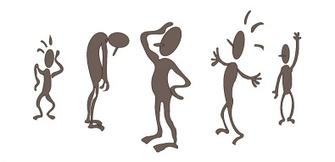Body language gives away tendencies...
Deception is not limited to shot-making. Body language and reading it applies to all parts of the game. For example, reading the body language of your partner may tell you what your next move should be. Can you see that he is going to poach? Then move to cover for his being out of position. Can you see that he is going to take the down-the-middle ball? Then move to cover your court.
The same principles apply to watching your opponents' body language. But this also can be used to your advantage. Faking a poach but returning to your position can cause a bad shot. This is similar to the situation described by Mark Renneson in his video How to Be Tricky.
This is the final post in the series on body language, deception, and unpredictability. Players need to recognize the value of using these techniques. At the same time, they are most valuable when used sparingly. They are one more tool to be used but not at the expense of perfecting normal shot-making techniques.
The same principles apply to watching your opponents' body language. But this also can be used to your advantage. Faking a poach but returning to your position can cause a bad shot. This is similar to the situation described by Mark Renneson in his video How to Be Tricky.
This is the final post in the series on body language, deception, and unpredictability. Players need to recognize the value of using these techniques. At the same time, they are most valuable when used sparingly. They are one more tool to be used but not at the expense of perfecting normal shot-making techniques.



No comments:
Post a Comment